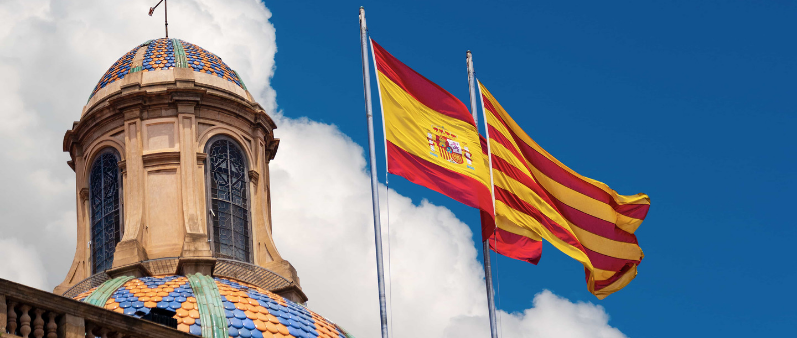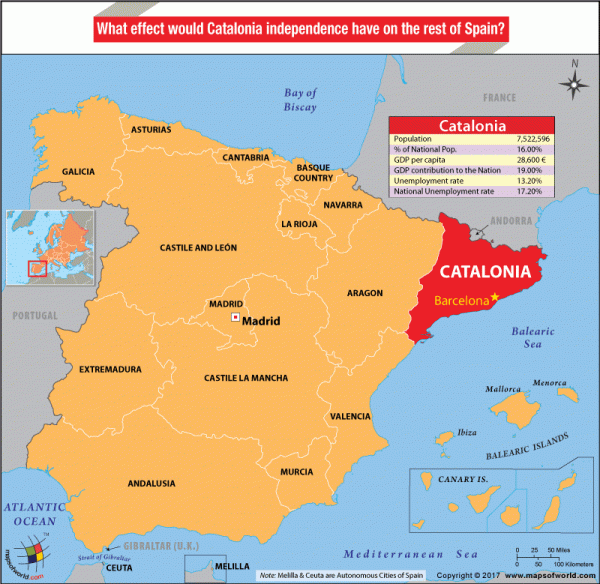
Go to Barcelona, they said…You will learn Spanish, they said. If it’s true that you decided to go to Barcelona with the idea of studying Spanish, you should know that it is probably not the best place for you to have a full immersion in this enchanting romance language. Surely you will still have the possibility to speak Spanish, as Barcelona is located in Spain. However, what you will hear and read in the street will probably be a different language: Catalan.
Don’t worry. You are not the only one. Many people, including me, have made the same mistake. You get there, you start reading signs, at the airport, in the buses, and you find out these are nothing like the Spanish you learned in school.
Let’s dive into the Catalan language to understand its roots as well as its peculiarities.
IS CATALONIA PART OF SPAIN? WHY A DIFFERENT LANGUAGE?
Barcelona is the capital of Catalonia, an autonomous community of Spain. In this region there are two official languages: Catalan and Castilian (as the Spanish language spoken in Spain is called, to distinguish it from the Spanish spoken in Latin and South America). This article will use both Spanish and Castilian to refer to the Spanish spoken in Spain.
Catalan is also the official language of Andorra, a microstate in the Pyrenees. It is a co-official language (together with Spanish) only in Catalonia, Valencia, and the Balearic islands.
Catalan and Spanish are two sister languages whose mother is Latin vulgar or Hispanic. Both have their origin in small texts dated between the tenth and eleventh centuries. Therefore, both languages were born at the same time.
However, Catalonian history tells a complex tale between two distinct regions of Spain. In the modern era, the Catalan government saw a decline first with the union of Castille and Aragon (1479), then with the assignment of Catalonia to France (1659), which later banned the use of the Catalan language. In the last century, with the Second Spanish Republic (1931-1939), the language saw a period of tolerance, that ended with the dictatorship of Francisco Franco, which lasted until 1975.
Franco banned the use of Catalan in schools and public administration for the entire period of his regime. Speaking Catalan was prohibited and therefore done only at home, in private, secretly.
With the end of his dictatorship and a transition to the democracy (1975-1982), the Catalan language acquired more prestige. It was no longer forbidden, so studying and speaking it was instead encouraged. The parliament of Catalonia declared Catalan the region’s official language to be used in education, public administration, and in the mass media.
THE CATALAN LANGUAGE TODAY
These days, Catalonia is trying to make its voice heard about independence for the country. The central government of Spain is currently against the creation of an independent state in Catalonia and it’s rejecting any attempt that goes in that direction.
In this political climate, the affirmation of the Catalan language becomes a way of reaffirming the Catalan identity and supporting independence ambitions.
Castilian is spoken by the 56% of the population, and speaking and learning Catalan is now highly supported. This is particularly important in the context of increased immigration in Barcelona (and the rest of Catalonia) during the last decade. Nowadays, about 268,000 expats live in the city. The municipality has been promoting the Catalan language in the last years, even offering free language classes.
I attended one of them, I only had to buy the book and the course was entirely free, which was a great opportunity to get to know a bit of the language and the culture as well.
As many foreigners currently live in Barcelona, and many other people moved to the city from different parts of Spain, Castilian and Catalan are both spoken. But, in this regard, the situations in which you would find both Catalan and Spanish at the same time are limited. Most likely one or the other will dominate.
Where Will You Hear Catalan and Where Will You Hear Spanish?
If you hit the gym or head out for a night with friends, your interactions would most likely be in Spanish. On the other hand, if you want to take part in some political assembly, join the public administration, or go to the theater, it would probably be in Catalan. The theater example is probably the most interesting: all the intellectual works are generally in Catalan. However, if you check out a funny and light show… it will be in Spanish.
The more intellectual the field, the more likely Catalan will be spoken. It’s as though they want to use the Catalan language for the cultural activities and Spanish for the lightest pastimes.
This controversial Catalan dispute arrived in the schools as well. To ensure that the study of Catalan language is constantly promoted, it has been decided that Catalan will be the main language of instruction in schools. As expected, this provision led to tensions among families who wanted their children to have Spanish language instruction in their community.
HOW DIFFERENT IS CATALAN FROM SPANISH?
Many people think Catalan is a dialect of the Spanish language, or that is pretty similar. Actually, while the two languages surely share many similarities, Catalan has more affinity with French or even Portuguese than Spanish. Some examples:
- The si us plau, that Catalan speakers use to say “please” is definitely more similar to the French s’il vous plaît than to the Spanish por favor.
- To say “thanks” in Catalan use merci, which is exactly the same word in French.
- In the morning a Catalan would greet you with bon dia which is like the Portuguese bom dia. They would say goodbye with adeu, which in Portugal would be adeus.
To me, Catalan sounds like a legendary language. It evokes in my minds stories of knights and princesses, dragons and elves. It could be because some words sound almost medieval to me, or perhaps I am way too imaginative. Everyone has his own perception of languages!
Essential Catalan Phrases
- Com et dius? (What’s your name)
- Encantat de conèixer-te! (Nice to meet you)
- Com va? (How are you?)
- Estic bé, gràcies! (I am fine, thanks!)
- I tu/vostè? (And you?)
- Parles anglès/català? (Do you speak English/Catalan?)
- Una mica/miqueta (A little)
- Quants anys tens? (How old are you?)
- Ha sigut un plaer parlar amb tu. (It was a pleasure talking to you.)
- Què vols dir? (What do you mean?)
- No entenc! (I don’t understand)
- No ho sé! (I don’t know)
- Perdó (Sorry)
- Com es diu en català? (How do you say it in Catalan?)
- Com es diu això en anglès? (How do you say this in English?)
WEEKEND IN BARCELONA
Now that you have a little Catalan under your belt, why not plan a visit to Barcelona. Check out our WEEKEND IN BARCELONA – HERE’S YOUR ITINERARY post for some travel tips and highlights!

1 Comment for "Catalan Language, History and Essential Catalan Phrases"